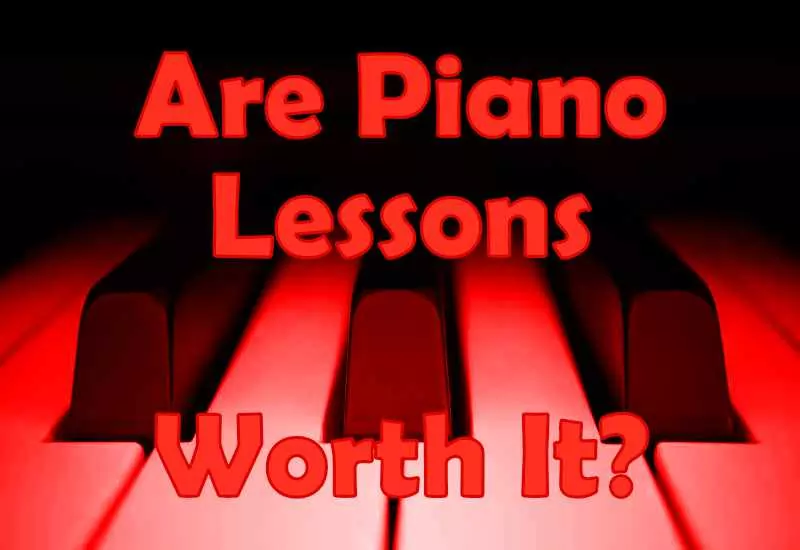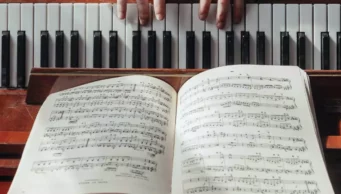Are Piano Lessons Worth It?

Contents
Is it Worth Paying for Piano Lessons?
“Amateurs practice until they get it right. Professionals practice until they can’t get it wrong.” -Professor Harold Craxton
When you take on something as challenging as learning how to play piano, there are things that you need to consider: knowledge and education, discipline, and perseverance. With this in mind, you might be wondering, “Should I take piano lessons? So, are piano lessons worth it?”
Before we proceed to the reasons why piano lessons are worth it, here are questions that will help you discover yourself a little bit more and whether or not you need piano lessons—because really, how do you know if you should take piano lessons or just self-study?
Related: Learn more about how much do piano lessons cost.
Why do you want to play piano?

Photo by Anastasia Kolchina
True enough, there are lots of reasons why someone would like to learn and play the piano. However, in this case, let’s narrow it down into two.
-
Recreational and One-Time Events
Maybe there’s an event in your school that needs someone to play an instrument, or you want to play your favorite songs and a few other songs that you find interesting on Spotify and later on jam with your friends on your free time. If your reason aligns with these, then you can just study independently. You can do this by watching tutorial videos on Youtube and Google, which are easy to learn since you only need to learn a few chords.
-
Passion and Deeper Knowledge
If you want to learn how to play the piano and really get into it by gaining knowledge about the basics of rhythm, music theory, reading sheet music, and notes—then you should definitely take piano lessons. Learning about these things independently might be doable, but is not ideal since it might be difficult to understand when you’re a beginner, and it’s essential to have someone who can teach you about these lessons, and guide you throughout your pianist journey.
Is there a good piano teacher in your area?
When learning how to play, a good teacher whom you can learn from is essential. After all, their knowledge, techniques, and the effectiveness of their teaching strategies are what make the difference between taking piano lessons and self-studying. You can do this by asking some of your friends, relatives, or by doing your research. By doing this, you can assure yourself of quality learning with just the perfect teacher that would work best for you.
Note: If there is no piano teacher in your area, you can take piano lessons online through Zoom, Skype, or Google meetings.
Are you willing to spend money?
Piano lessons are costly, given that you need an instrument and a great teacher that will help you grow as a pianist. Think of it as an investment that will be worth all the time, money, and effort that you put into it.
If you can’t afford piano lessons but still want to learn how to play the piano, don’t worry! You can use tutorial videos on Youtube and Google. However, you need to make sure that you stay highly motivated, persistent, and vigilant throughout the whole process since it can be complicated and might take you a long time since you need to research and study everything on your own.
Is there a type of music that you love and enjoy playing?
Motivation comes, but it doesn’t stay. The first time you discover that you want to play the piano, it’s no question that you’re very eager and motivated to learn. But what can be quite challenging is keeping the eagerness and motivation in the long run. This is where discipline and enjoyment come in.
Ask yourself, “Is there a type of music that gets me excited?”. Maybe pop music? Classical? Jazz? No matter what type it is, make sure to know and be aware of what you enjoy playing. Playing songs that you like will help you keep going and eventually re-ignite the spark for music you have within you. A good teacher will assist and guide you in the direction you’re about to take, depending on the type of music that interests you, to make sure that you’re having fun while learning.
Is now the time to take piano lessons?
Yes! Definitely.
Now that you’ve discovered a little bit more about yourself and the reasons why you need to take piano lessons, let’s now proceed to the reasons that make piano lessons worth it.
Why Piano Lessons Are Worth It
-
Systematic Learning
- From finger numbers and hand coordination to reading music sheets, notes, and learning the basics of rhythms and music theory, taking piano lessons will guide you to an organized flow of lessons that will make it easier for you to learn and guarantee learning progress weekly. You’ll be able to learn where to start—the basics, some tips, and techniques to remember, and other exclusive knowledge and activities from your teacher that increase in difficulty as the session progresses. Having systematic learning will get you to the step-by-step process and prevent confusion.
-
One-on-One Attention
- Since you’re at the beginner stage, you’ll most likely make beginner piano mistakes that will slow down your progress, and you might not be aware of it. It’ll be difficult to determine if you’re making silly mistakes—is your posture bad? Is your timing right? Do you play too angsty for a soft piece? When you study and play on your own, chances are, you might not know these things on your own. This is why having a piano teacher is important. Your piano teacher can help you fix these things and steer you on the right path so you can improve. They will also teach you about studying, researching about the composer and the piece that you will be playing so you can internalize better, and then add flare in your own interpretation later on.
- By having a piano teacher by your side, may it be physical or on-screen, you have the chance to ask situational questions, clarifications, be exposed to lots of musical ideas that you wouldn’t discover without their help, and be guided and assisted if you’re doing something wrong so you can correct and improve it right away.
-
Having a Schedule
- Learning to play the piano is all about commitment. It’s all about asking yourself, “How committed am I to reaching my goal?” Taking piano lessons is one way to make you consistent in achieving and being closer to your goal weekly. When you pay for lessons, you’re held accountable and you’re more likely to practice since you invest money and time in it. Also, by having an organized lesson and music sheets that you can look forward to weekly, you’ll be motivated to practice and attend sessions with excitement and eagerness.
- Having a constant schedule to practice and learn piano lessons also trains you to establish self-discipline. Just like what was mentioned earlier, motivation comes, but it doesn’t stay. Self-discipline allows you to act and study even without motivation, which would help you not just in your learning progress as a pianist, but also in other aspects of life.
-
Perfect Approach
- Have you ever experienced trying to watch tutorial videos on Youtube and it doesn’t seem to work out for you, but when you tried learning about the same topic on Google sheets, you were able to understand it in an instant? This is because we all have different learning styles that require individualized approaches. Some are auditory learners who learn as they follow what they hear, while some are visual learners who learn through sight-reading and music sheets. Others are tactile learners who learn through being able to touch the keys physically and follow their muscle memory. To some people, chances are, they’re a combination of maybe two or three of these learning styles. Having someone beside you who is an expert in learning and playing the piano can help you recognize your learning style, and have an effective learning process by providing the right approach for you.
-
Gets You to Persist and Stay Determined
- It takes a lot of patience to learn how to play the piano. It’s not something you can easily get in one try—or ten or twenty tries. Maybe thirty or hundreds to thousand tries until you reach—not perfection—but betterment and progress. Certainly, there will be ups and downs, along with frustrations and disappointments. Having a piano teacher that guides you along the way will help you realize that as a beginner who’s still in the process of learning, you’re bound to make mistakes, and that’s okay. What’s important is to remember that in each day and trial, you get better and better until you reach your own definition of perfection. Your piano teacher can motivate and encourage you to keep going whenever you feel like giving up. They will play a role in making you realize that all you need to do is to persist and be consistent to make progress and be the best version of yourself.
Conclusion
Piano lessons and self-studying are both essential steps in learning how to play piano effectively. Even though you’re taking piano lessons, your learning process should also continue at home. It’s important to commit your time to solving problems by yourself and practicing the songs that were given to you by your teacher at home during your free time to further improve your ability and enhance your understanding regarding the lesson by applying it.
Lastly, don’t be too harsh on yourself. You’re are doing your best, and your best doesn’t have to be perfect yet. You still have a lot to learn, and you’ll get better as you continue learning. Remember that frustrations and disappointments too, are sources of growth. The challenge there is to keep trying, stay determined, and with faith in yourself, and repeated trial and error, you’re bound to have a successful outcome eventually.
Parents, Teachers & Sheet Music Seekers:
If I offered to provide you hundreds of legit sheet music PDFs for your kids:
- Brand-New & Exclusive Compositions
- Age & Level Appropriate
- With INSTANT Online Access
- Worry-FREE Licensing & Copyright
...would you take me up on that offer?
ABOUT
I started Music4Kids with a simple goal in mind: To provide valuable information to guiding parents who want to raise musically inclined kids.
Click to read on